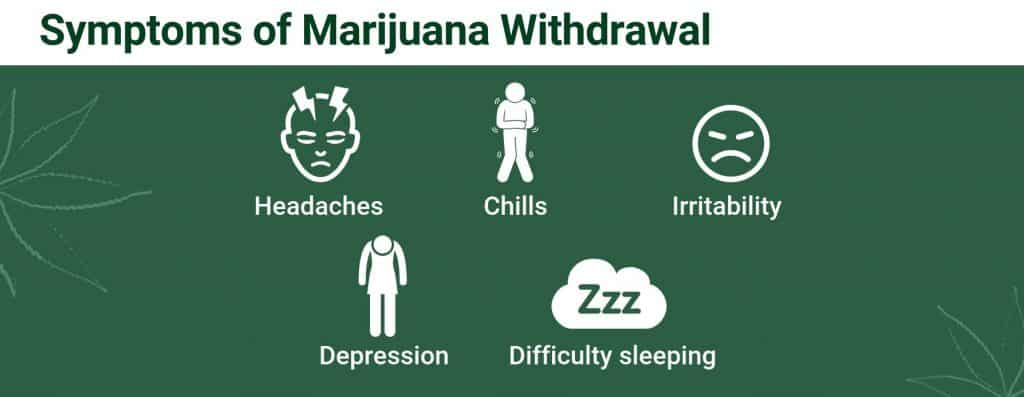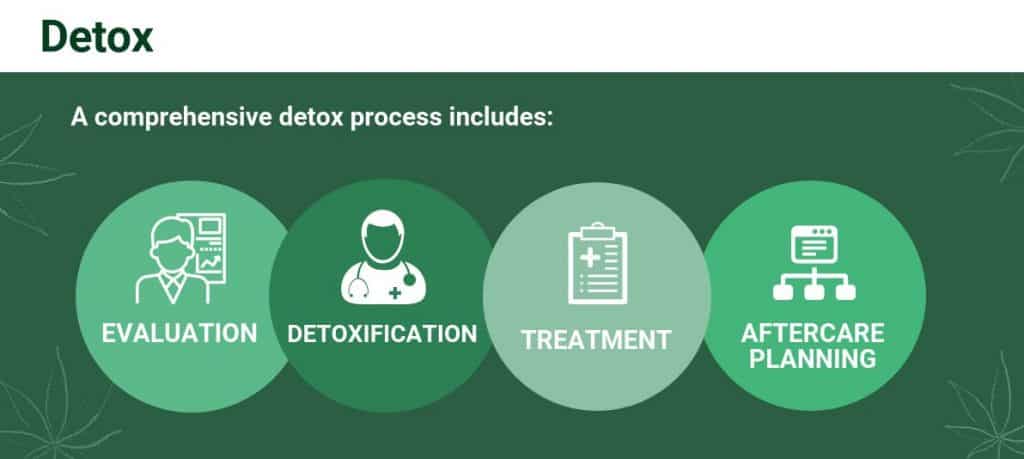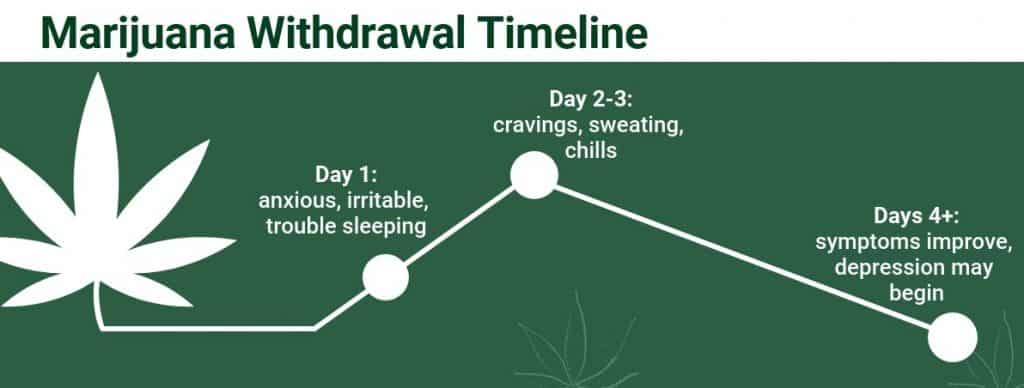How to Get Through Weed Withdrawal Easy
Although some believe it's not addictive, studies show marijuana addiction is possible. However, it may have a lower occurrence rate than other drugs.
Article at a Glance:
- Headaches, irritability, sweating, nausea and difficulty sleeping are symptoms of marijuana withdrawal.
- Generally, weed withdrawal symptoms peak during the first week after quitting and begin to improve within two weeks.
- Weed withdrawal is often most comfortable in a medically supervised facility, where doctors and nurses can monitor symptoms and help with discomfort.
- The Recovery Village's detox process includes detoxification, marijuana addiction treatment and aftercare planning.
- No specific medications curb marijuana cravings, so it is important to avoid environments and people who hinder your recovery.
When a person who frequently uses large amounts of marijuana suddenly stops, they can go into withdrawal. As with many other drugs, marijuana withdrawal can be very uncomfortable and often causes people to begin using the drug again.
For this reason, a marijuana detox program can help increase the chances of long-term recovery. In marijuana detox, you can take your first steps toward sobriety in a safe, secure environment where withdrawal symptoms are managed by a team of medical professionals.
Marijuana Withdrawal Symptoms
Heavy marijuana use can cause chemical changes in the brain, making the person physically dependent on the drug. These chemical changes are why a person might have uncontrollable cravings to use marijuana; it's also why their body may have unpleasant reactions when they stop using it. These reactions are part of withdrawal and are why marijuana is an addictive drug.

Although some believe marijuana is not addictive, marijuana addiction is possible — especially in adolescents. People who use marijuana before the age of 18 are four to seven times more likely to develop marijuana addiction than adults. In other words, the earlier in life a person starts using marijuana, the more likely they are to become addicted to the substance.
Withdrawal from marijuana is also known as marijuana withdrawal syndrome. Symptoms of marijuana withdrawal syndrome may include:
- Marijuana cravings
- Thirst
- Dry mouth or throat
- Hunger
- Mellow feelings
- Increased appetite
- Increased sexual arousal
- Strange or vivid dreams
- Irritability and anger
- Restlessness
- Depression and anxiety
Marijuana Withdrawal Symptom Severity
There are many different factors that affect marijuana withdrawal symptoms. Symptoms are typically more pronounced with chronic, frequent marijuana use. In other words, people who have used large amounts of marijuana for a long time may have more severe withdrawal symptoms. This is because it's more likely that the person will have a heavy physical dependence on marijuana when they quit. If marijuana is combined with other substances, such as illicit drugs or alcohol, withdrawal symptoms may be heightened as well.
Withdrawal Symptom Complications
Detoxing from marijuana often causes side effects and withdrawal symptoms that are uncomfortable at best. For example, thirst is one of the most common withdrawal symptoms. If a person does not drink enough water over several days or even weeks, they can easily become dehydrated. Dehydration will likely deplete nutrients that the body needs to maintain optimal health. If dehydration becomes severe enough, it can cause potentially fatal seizures.
Withdrawal can feel like an illness, so it's important to go through it with the right help. It's often more comfortable to begin the withdrawal process in a medically supervised facility, where doctors and nurses can monitor symptoms and help with discomfort. They may administer over-the-counter medications to help with common side effects, such as headaches and flu-like symptoms. Prescription medications may be used to treat more serious symptoms, such as tremors and insomnia.
Marijuana Detox
Marijuana detox can cause withdrawal symptoms because of the body's physical dependence on delta-9-tetrahydrocannabinol (THC), a chemical found in marijuana. THC can cause both psychological and physical changes in the body, complicating the quitting process.
During detox, the body has to recalibrate itself because the drug it's dependent on is no longer present. The resulting withdrawal symptoms can be very unpleasant, and certain forms of detox only make them worse.
Quitting Cold Turkey vs. Tapering
Some people may think it's best to end marijuana use abruptly, or go "cold turkey." Unfortunately, this often causes worsened withdrawal symptoms. Suddenly quitting marijuana can shock the brain into thinking it doesn't have an essential chemical, causing withdrawal reactions to occur quickly and in full force.
In contrast, tapering consists of gradually lowering a marijuana dosage over time to make withdrawal symptoms more bearable. Further, participating in a rehab program or visiting a detox center can often be more effective than what you can do at home to detox from marijuana.
Detoxing at a Medically Supervised Facility
When you undergo the detox process at a medically supervised facility, you are monitored around the clock by doctors and nurses who specialize in marijuana withdrawal. These medical staff members can quickly address any side effects that arise, which eases the withdrawal process and gives you a more comfortable path to sobriety.
Detoxing at Home
An at-home detox can be done on your own or under the care of a medical professional on an outpatient basis. The downside of detoxing completely on your own is that you lack medical support for withdrawal symptoms. If you detox at home under the care of a doctor, however, you can reach out to report withdrawal symptoms that can then be treated. Since you are at home, though, symptoms may not be treated as quickly as they would if you were in a medically supervised facility.
If you do choose to detox on your own, please be aware of the risks and limits of what you can do at home. Ensure that you have a loved one who can monitor you for any adverse symptoms, and consult with a doctor before tackling any major medical milestones.
Marijuana Detox and Withdrawal Timelines

The marijuana detox and withdrawal timeline can vary depending on a variety of factors, such as the severity of the addiction and the detox method used. Further, detox is typically just one small part of recovery — it's what comes next that can really make a difference in long-term healing. If you undergo treatment at a rehab center like The Recovery Village, detox will be the first crucial step in recovery from marijuana.
Withdrawal Detox Timeline
Whether you complete detox at a rehabilitation center or at home, the timelines for detox and withdrawal can vary. The timeline may be a relatively small window for some people, while others may take days or weeks to overcome withdrawal symptoms. If you are participating in a rehab program, you can expect to stay in medical detox for a week or more. Keep in mind that the detox timeline is unique to every person, so what may only take a few days for one person to accomplish could take weeks or months for someone else.
Duration of Withdrawal Symptoms
Symptoms may persist for days after detox. During the first three days of detox, a person is likely to have the most severe symptoms. After this point, many symptoms improve for most people. However, cravings and psychological side effects like depression may set in, which is why it's important to undergo treatment under the care of a medical professional. During the next several days and weeks of detox, the body can heal and move on without substances.

Detox Medications and Remedies
While some medications exist to help people detox from drugs like heroin and cocaine more easily, there is currently no specific taper medication for marijuana withdrawal. Doctors can administer medications to treat individual symptoms, but there is no specific medication to help stop marijuana cravings or the withdrawal process in its entirety.
When going through detox and recovery, it's important to take meaningful, deliberate steps toward success. Finding support groups, practicing mindfulness and finding a new passion are all strategies for long-term healing.
Support Groups
Programs such as Narcotics Anonymous and Marijuana Anonymous are known for providing a sense of community and camaraderie among those in recovery. People going through detox therapy may find an added level of comfort in the emotional support a 12-step program can provide, both during and after treatment. Being surrounded by recovery success stories is also motivation that can help keep someone on track as they detox.
Mindfulness, Meditation and Healthy Habits
Practicing mindfulness or meditation can help provide a sense of peace and relaxation in stressful or painful scenarios. Meditation is a simple practice and requires no outside tools or knowledge. To meditate, simply sit or lay down on the ground and close your eyes. Breathe in and out, noticing your breath. Some people count their breaths as they meditate; others focus on the feeling of their lungs expanding and contracting. As this goes on, you'll eventually learn to let go of external thoughts and stressors. You may meditate for as long as you choose, but studies show even as few as three minutes of meditation per day can be beneficial.
Some also choose to repeat affirmations while they meditate. Affirmations are positive statements a person says about themselves that promote a positive mindset and outlook. Repeating affirmations such as, "I am strong and I will overcome my marijuana addiction," can help you feel relaxed, centered and capable of completing the task at hand.
Accompanying meditation with gentle, healthy exercises and eating balanced meals will also give the body the fuel it needs to fight withdrawal symptoms and help you recover sooner. Even taking a short, daily walk can make a significant difference in relieving symptoms.
Avoiding Triggers
What doesn't help in your recovery, however, is holding on to the people, places and things that may contribute to marijuana use and addiction. If you're serious about moving on from drugs or alcohol, it's important to maintain a supportive environment and find people to connect with. By undergoing marijuana detox at a licensed facility with supportive staff, you'll get the help you need to move forward without substances.
Our Detox Process
The Recovery Village offers a comprehensive detox process that allows for a seamless transition into an inpatient or outpatient rehabilitation program. The treatment process includes:
Detoxification
During detox, the goal is to make clients as comfortable as possible so they can heal accordingly.
Treatment
Following detox, our staff will initiate a treatment plan customized to your specific needs.
Aftercare Planning
Nearing the end of treatment, our center will also begin to prepare an aftercare plan for patients.

Editor – Jonathan Strum
Jonathan Strum graduated from the University of Nebraska Omaha with a Bachelor's in Communication in 2017 and has been writing professionally ever since. Read more

Medically Reviewed By – Dr. Jessica Pyhtila, PharmD
Dr. Jessica Pyhtila is a Clinical Pharmacy Specialist based in Baltimore, Maryland with practice sites in inpatient palliative care and outpatient primary care at the Department of Veteran Affairs. Read more
National Institute on Drug Abuse. "Marijuana Withdrawal Is Real." April 2, 2015. Accessed October 3, 2021.
Lee, Dayong; Schroeder, Jennifer R.; Karschner, Erin L. "Cannabis Withdrawal in Chronic, Frequent Cannabis Smokers during Sustained Abstinence within a Closed Residential Environment." American Journal of Addiction, May 2014. Accessed October 3, 2021.
National Institute on Drug Abuse. "Marijuana Research Report: Is marijuana addictive?" July 2020. Accessed October 3, 2021.
Ramesh, Divya; Schlosburg, Joel E.; Wiebelhaus, Jason M.; Lichtman, Aron H. "Marijuana Dependence: Not Just Smoke and Mirrors." ILAR Journal, March 24, 2013. Accessed October 3, 2021.
Medical Disclaimer
The Recovery Village aims to improve the quality of life for people struggling with substance use or mental health disorder with fact-based content about the nature of behavioral health conditions, treatment options and their related outcomes. We publish material that is researched, cited, edited and reviewed by licensed medical professionals. The information we provide is not intended to be a substitute for professional medical advice, diagnosis or treatment. It should not be used in place of the advice of your physician or other qualified healthcare providers.
Source: https://www.therecoveryvillage.com/marijuana-addiction/withdrawal-detox/
0 Response to "How to Get Through Weed Withdrawal Easy"
Post a Comment